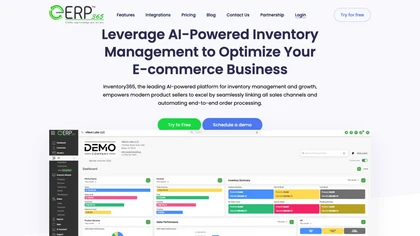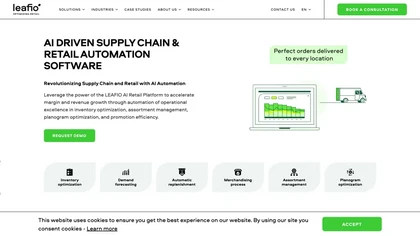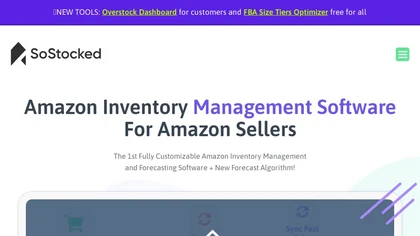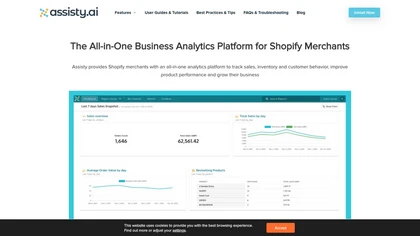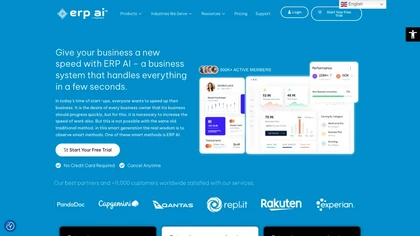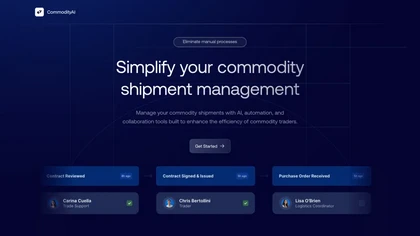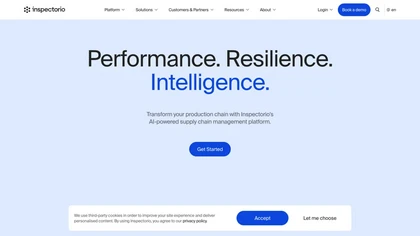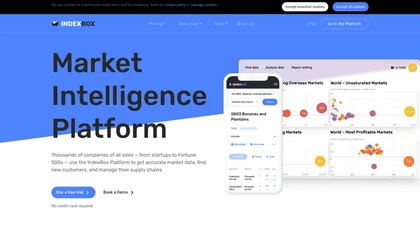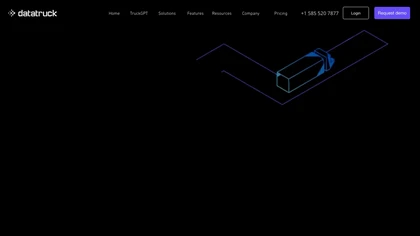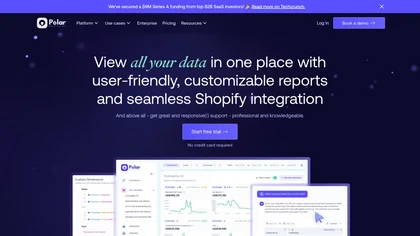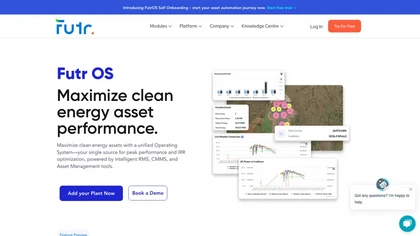AI use cases for Inventory Management
Generative AI can be applied in various applications for inventory management. Here are some examples to explore below for inspiration with AI tools to get you started with using AI in inventory management.
🛠️ 70 AI tools for Inventory Management
Explore a dynamic list of some of the most popular tools to get you started with various AI use cases and applications for Inventory Management to streamline your workflows and productivity today.
Inventory365 features
- Real-Time Inventory Tracking
- Warehouse Management
- Multi-location Fulfillment
- AI-Powered Demand Prediction
- Seamless Integration
Demand Forecast features
- Utilizes classical machine learning algorithms
- Allows uploading data sets from Excel
- Automatically selects the best model for each product
- Provides clear visualizations and interactive graphs for demand predictions
- Includes features like historical data analysis, outlier detection, model competition algorithms, and KPI forecast systems
5-Out features
- Predicting sales
- Optimizing labor
- Optimizing purchasing
- Quick setup
- Getting started
LEAFIO AI Retail features
- AI-driven supply chain and retail automation software
- Automation of inventory optimization, assortment management, planogram optimization, and promotion efficiency
- Features such as demand forecasting, automatic replenishment, and merchandising process optimization
- Caters to various industries including retail, grocery, convenience stores, pharmacies, liquor stores, etc.
- Comprehensive suite of AI-powered tools to streamline retail operations and drive profitable growth
Reform features
- Modular building blocks for customized solutions
- State-of-the-art multimodal AI models for logistics documentation
- Automation of data capture for various documents
- Seamless integration with universal transportation management systems (TMS) through a universal API
- Embeddable customer dashboards for real-time data insights
SoStocked features
- Amazon inventory management
- Forecasting
- Customizable features
- Data migration
- Personalized onboarding support
assisty.ai features
- Retail chatbot menu tool
- Generating inventory and sales reports
- Exporting data and creating custom dashboards
- User-friendly pre-built reports
- Advanced data drill-down and automation capabilities
🔥
Create your account, save tools & get personal recommendations
Receive a weekly digest of our handpicked top tools.
Unsubscribe anytime
MEJ ERP AI features
- Intelligent automation
- Data-driven insights
- Real-time analytics
- Predictive forecasting
- Seamless integration capabilities
retalon.com features
- Predictive analytics
- Demand forecasting
- Merchandise planning
- Smart fulfillment
- Ecommerce operations
CommodityAI features
- Automated shipment processes
- Auto-generated shipping nominations
- Real-time shipment tracking
- AI-driven performance analytics
- Smart data extraction
inspectorio.com features
- AI-powered supply chain management platform
- Utilization of innovative technologies like AI
- Digitizes and connects supply chain processes within a single tool
- Enables intelligent analysis of the entire ecosystem
- Reduces production chain risks through advanced analytics
Unfig features
- Automated data capture from various logistics documents
- Universal TMS integrations for seamless connectivity
- Embeddable customer dashboards for real-time data insights
- Scraping information from numerous sources for visibility into logistics data
- Streamlining logistics operations with unprecedented speed and efficiency
Vendorful.ai features
- Vendorful ai-powered response management streamlines responses to rfps, rfis, rfqs, and it security questionnaires with ai assistance.
- It is particularly useful for overworked account executives, rfp teams, and startup founders.
- Currently free while gathering feedback.
- Vendorful assures data security through encryption and organization-level data separation.
Convictional features
- Streamline onboarding vendors
- Standardize product content for retailers
- Reduce merchandising tasks by up to 75%
- Automated vendor payouts through integrated systems like Stripe
- Supports a range of integration methods with major ecommerce platforms like Shopify and Magento 2
Dairytech.ai features
- milkround automation
- automatic payment collection
- stock reconciliation
- online order management
- customer communication
Skipped features
- Collaborative fulfillment platform
- Enables selling out-of-stock product variants
- Real-time e-commerce network
- Capturing sale opportunities easily
- Sharing of margins within merchant network
FolioProjects features
- AI project management assistant
- Data-rich dashboards for analysis
- Project portfolio management workflow
- Enterprise asset management life cycle support
- Predictive, prescriptive, and generative AI capabilities
Sku Fetch features
- Data fetching from multiple suppliers
- Support for popular marketplaces
- Keyword finder and product UPC addition
- Competition analysis and reviews integration
- Leverages OpenAI capabilities for rewriting and summarizing
Brightflow AI features
- Ecommerce financial intelligence platform
- AI-powered financial services
- Accurate cash flow forecasting
- Real-time cash position monitoring
- Integration with popular ecommerce tools
Reform features
- Modular building blocks for rapid customization
- Automated data extraction from various documents
- Seamless integration with universal TMS platforms
- Real-time visibility into logistics data
- Efficient data scraping from multiple sources
Inventive features
- Streamline rfis, rfqs, security reviews, rfps
- Generate reliable answers with ai
- Reduce reliance on subject matter experts
- Save substantial time and effort
- Up-to-date content
Incremental ai features
- Retail media measurement
- Commerce analytics
- Portfolio management
- Predictive analytics
- Cross-channel commerce analytics
IndexBox
5IndexBox features
- Access to accurate market data
- User-friendly interface for quick generation of market reports
- Predictive modeling for forecasting market trends
- Machine learning capabilities
- Data integrity through cross-checking from multiple sources
Manifest AI features
- Product recommendation
- Natural language processing
- Customization
- Purchase decision support
- Multilingual
E-Procure AI features
- Zero-code AI platform integration
- Recommendation of supply locations and suppliers
- Market expansion assistance
- Product opportunity identification
- Real-time exchange rate inquiries
GearChain features
- Real-time AI-powered inventory management
- No-code builder for customizing forms and generating barcode scans
- Blockchain technology for data integrity and transparency
- Role-based access control for security
- AI algorithms for auto-generating forms
Scandilytics features
- Advanced analytics for store performance insights
- Business advice based on data analysis
- Automated reporting processes
- Connection with analytics accounts for data translation
- AI-based trend analysis and opportunity identification
Trade Foresight features
- Trade insights
- Tools for decision making
- Proprietary trade-technology
- Market access
- Affordable cost
Predict Expert AI features
- Crafting unique AI models
- Integrating intelligent applications and APIs
- Tailoring AI models and applications to address specific business needs
- Real-time operational insights
- Monitoring performance in real-time
XO Analytics features
- E-commerce analytics platform
- Next-gen e-commerce integrations
- Customizable alerts
- Real-time performance monitoring
- Personalized data-driven tips
WasteAID features
- Automatic route auditing
- Integration with existing systems
- Audit over 400k generators and 1m+ pickups
- Detect overflow incidents and identify contamination
- Tracking commercial account compliance
Forescribe features
- Discover, analyze, and manage integrations of SaaS applications
- Provide real-time insights on SaaS usage and compliance
- Automated compliance checks for SaaS applications
- Offer cost optimization suggestions for SaaS applications
- Enhance transparency in digital landscape governance
Datatruck features
- Automating manual processes
- Providing reporting analytics
- Offering actionable insights through AI/ML analytics
- Hyper automation capabilities
- Seamless data integration and real-time visibility
Data Analyst AI features
- Data Analyst AI
- Automated reporting
- Tailored marketing strategies
- Streamlined marketing efforts
- Secure data processing
Covonyx features
- Estimates e-commerce shipping and fulfillment arrival dates
- Determines end users' zip codes for precise location detection
- Estimates tax rate in the cart based on user's location
- Provides API for developers to customize shipping estimates
- Enables fulfillment prioritization based on business days, holidays, warehouse locations, and product inventory
secretsaucepartners.com features
- Fit Predictor
- Style Finder
- Outfit Maker
- Seamless integration
- A/B testing
Deftship features
- Cloud-based logistics solution
- Automation features for creating rules based on conditions
- Carrier integration without coding
- Real-time freight quotes
- API functionality for limitless possibilities in shipping processes
Polar features
- 1-click integrations
- Custom reporting dashboards
- Predictive forecasts
- Smart alerts and insights
- First-party attribution
ProAI features
- Business strategy generator
- Interactive Guidance and follow up
- Metrics monitoring and insights
- Market research
- Financial forecast
- Pitch deck generator
RestoGPT features
- Create customized online ordering platform
- Seamless integration with pos systems, sales platforms, and delivery services
- Automated order management, sales, and deliveries
- Efficient online ordering experience for customers
- Simplify online ordering process
Fforward features
- Extract valuable insights from interview transcripts
- Identify customer opportunities
- Synthesize themes across multiple interviews
- Customizable accessibility options
- Collaborative filtering systems for better suggestions
Push Lap Wholesale features
- 97% matching accuracy
- Analyze thousands of products in minutes
- Bulk upload lists of suppliers for product search
- Accurate profit calculations and demand estimation
- Powerful sorting and filtering options
Standard Retail. features
- AI-powered retail analytics
- Comprehensive overview of store performance
- Leverage first-party data
- Uncover hidden trends and patterns
- Actionable recommendations
Delineate features
- Unified analytics for financial, customer, product, and marketing insights
- AI predictive lead scoring
- Customer analytics, cohort analysis, customer lifecycle analysis, and customer segments
- Scenario simulation
- Data integration from various sources
Saara.io features
- Focus on solving common industry challenges
- Reduce operational costs
- Analyzing customer data for personalized offers and improved shopping experience
Cargo features
- Data visualization
- Data discovery
- Data integration
- Automated reporting
- Revops workflow
ComeHome features
- Item list creation
- Cost estimate generation
- Quote comparison
- AI-powered inventory list generation
- Secure data sharing with movers
Smartersales features
- Integration with zoom, teams, and meet
- Automated crm data entry
- Instant personalized feedback
- Detailed performance dashboards and summarized email reports
- Customizable experience
TradeInt features
- Comprehensive global trade solutions
- Access to import and export data from major trading economies
- Data-driven strategies development
- Identification of new market opportunities
- Global trade analytics
Potions features
- Personalized product recommendations
- Smart sorting of list pages
- Cookie-free personalization technology
- Seamless integration
- Real-time performance monitoring
AI Store Manager features
- Ecommerce management
- Gpt-4 technology
- Conversational ai assistant
- Analytical and reporting capabilities
- Product catalog management
- Order management
- Customer information management
- Functionalities and automations optimization
- Checkout processes
- Staff member addition
- Gdpr and ccpa compliance
CandorIQ features
- Global benchmarking data
- Churn prediction analytics
- Real-time collaboration capabilities
- Integrations with various data sources
- Automated processes like merit letters and candidate offers
FrequentlyAI features
- Answering amazon-related queries
- Using gpt4 for complex answers
- Using gpt3.5 for faster responses
- Curated by a team of experts
- Ongoing updates
wesupplyAI features
- AI model analysis
- AI model building
- AI model deployment
- Dataset uploading to secure cloud environment
- Integration of personalized APIs
Entrov features
- Partner sourcing
- Simplifies partner sourcing process
- Reduces average sales cycle times
- Increases deal sizes
- Customized partner profiles
FutrOS features
- Unified operating system
- Warranty management
- Digital twin technology
- Automated performance insights
- Real-time alerts
FinanceOps features
- Modernize collection operations
- Enhance collector efficiency
- Assign collections automatically
- Utilize AI-powered worklists, payments, and messages
- Integrate with leading ERP solutions
Mom shop app features
- AI-powered features
- Streamlined e-commerce
- Effective service management
- AI-generated content
- Simplified order management
idPOD features
- Data integration and analysis
- Integration of multiple data sources
- Advanced algorithms
- Customizable features
- Improving decision-making
Ask String features
- Data analysis
- Efficient
- Simplify
- Direct conversations
- Technical skill level
Bara Platform features
- Advanced artificial intelligence tool
- In-depth analytics and predictive insights
- Cutting-edge algorithms and machine learning capabilities
- Intuitive dashboard for visualizing complex data sets
- Actionable insights for strategic decision-making
Out Of The Blue features
- Real-time revenue-impacting event detection
- Identification of revenue leaks and issues
- Detection of revenue-impacting infra errors and user engagement/navigation issues
- Transition from manual monitoring to AI-driven proactive approach
- Optimizing ad spends and customer communication
AI Assist by airfocus features
- AI-generated ideas and drafts
- Sentiment analysis
- Utilize slash commands
- Prompt features for PRDs and user stories creation
- Feedback sentiment analysis
ScrumDesk features
- Utilizes technologies to streamline project management processes
- Enhances collaboration among team members
- Organizes tasks efficiently
- Prioritizes work to achieve project goals
- Provides structured approach to project management
Prodhub.ai features
- Task automation
- Auto-generation of product requirements
- Proprietary data generative AI
- Collaborative product development
- Export to various tools
InsightFactory features
- Trending search term identification
- Keyword research
- Competition analysis
- Sales tracking
- Automated title and description generation
ConsumerAI features
- Product recommendation
- Ai based
- Question
- Problem solving
Finalview features
- Product review analysis
- Sentiment analysis
- Feature and performance insights
FlowCog features
- User-friendly Flowcog Canvas for financial projections
- AI-driven inputs for streamlined modeling process
- Support for integrations with QuickBooks and Stripe
- Detailed financial statements and saas metrics
- Simulation analysis and data visualization dashboards
Inven features
- AI-powered search
- Identification of high-potential companies
- Market overviews
- Connection with owners
- Access to industry players and data points
